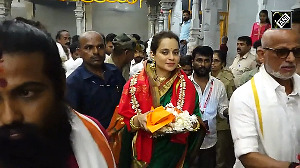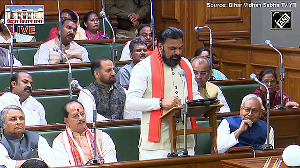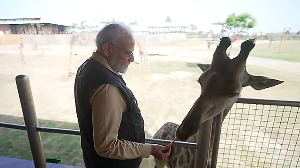So far so good. That is how the people in Jammu and Kashmir are generally feeling about the historic political change brought about by the electoral process in the second half of 2002.
It has not been an unmixed blessing though. Blood letting refuses to go away. But the course of events on the ground seems to have taken a different -- hopeful -- direction, promising much needed relief from the distress.
Things indeed looked pretty bleak a few months before the assembly election. Moderate separatist leader Abdul Gani Lone was assassinated in May just as he appeared to be spearheading a paradigm shift in the balance of power within the secessionist conglomerate, the Hurriyat Conference which symbolises the political face of the underground militant movement. It was not difficult to realise who benefited from Lone's elimination from the scene, although the precise identity of his killers is yet to be established.
A series of bloody events, preceding and following the assassination, underlined the gravity of the challenge to anyone who dared to stand up and be counted. While the people at large gave sufficient indication of their desire to support any serious effort to extricate them from the bloody mess, the ruling establishment of the day did not match up to this prospect.
Farooq Abdullah, who led the state's formidable political force -- National Conference -- and presided over its ruling wing showed little appetite for any worthwhile action to stem the rot. His administration remained virtually defunct and he chose the most inappropriate time to pass on the dynastic mantle to his son Omar Abdullah.
The result was unmitigated disaster for both, the dynasty and the National Conference. Poor Omar had to bite the dust, more for what his father had done. The untested leadership -- Omar whose political grounding took place far, far beyond Kashmir looked to be outlandish at the outset itself. But Farooq was not aware of the extent of erosion right under his feet. It was not only a sharp dip in his popularity but, worse, the loss of the credibility of his leadership.
The Abdullah legacy could not have suffered a more humiliating setback. For the first time, no member of the dynasty could make to the state legislature. It was unthinkable, as much as it was unprecedented.
As the year neared its end, a new order was beginning to shape in Kashmir. The contours of a new political landscape were showing up though slowly. Perhaps it was the first case where a sort of political wave came to be generated after the election. That wave is sweeping across the valley. The political vacuum that had bedeviled the state for over a decade is showing signs of receding.
After a long, long time, there are heartening indications of popular support for administrative actions. It is sort of a silent mobilisation that is taking place, for the good of everyone. The political executive headed by Mufti Mohammed Sayeed has been gaining ground, enlarging its popularity and reinforcing its popular credibility, despite quite a few odds, not excluding its delicate political composition.
What is encouraging is that, contrary to the general impression created by election-related polemics on the national stage between the Congress, which is a major partner in the Kashmir coalition, and the BJP which has an alliance with Farooq's National Conference, the central government has been showing a remarkable degree of empathy as well understanding towards the Mufti-led regime.
That is what adds to the popular belief that this 'experiment' might succeed, despite odds. On its success depends the fate of the ultimate objective of regaining lost ground -- psychological, emotional and political.
The signals available at the year end are undoubtedly promising.






 © 2025
© 2025